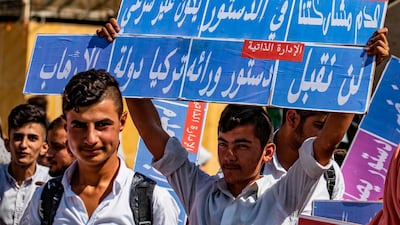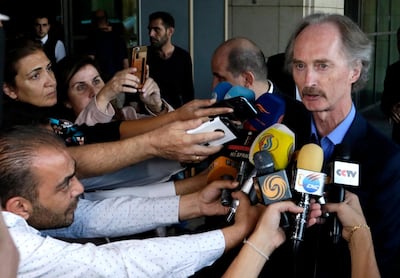Last week Syria's UN envoy Geir Pedersen announced that the country's warring parties and their backers had finally agreed on the make-up of a constitutional committee to draft a post-war charter. It took nearly two years for the regime of Bashar Al Assad, plus the opposition, Russia, Iran and Turkey, to agree a list of 150 representatives, reflecting both sides of the war and including members of the civil society organisations that emerged from its chaos. The opposition published details of its own delegation on Monday while the final list has been leaked online.
There is, rightly, ample scepticism towards the process and whatever emerges from it. A new constitution won't guarantee that any of the demands of the revolution, particularly the removal of Mr Al Assad, will be achieved. Many doubt the credibility of any constitutional committee created without popular consensus and see the process as lending legitimacy to a totalitarian regime responsible for the deaths of hundreds of thousands of Syrians.
But it might just be the best hope that those who struggled for a fairer Syria can have a say in their country’s future.
Mr Al Assad, with the unflinching support of Moscow and Tehran, has managed to claw back most of Syria militarily from rebels fighting to overthrow him. Only the province of Idlib, parts of the north under the control of Turkish proxies, and parts of eastern Syria held by US-backed Kurdish militias remain in the hands of rebels.
The idea for a constitutional committee originated years ago and was mired in delays as negotiations took place to concoct a list that was acceptable to all parties. Many in the opposition saw it as a futile exercise, intended to divert Mr Al Assad's opponents away from demands for his removal as he regained momentum in the military conflict.
With the opposition largely disparate and defeated, and with limited international support, there are few clear paths to continue along in the struggle for a new Syria.
In the formation of the constitutional committee, one key issue is representation. There are hardly any Kurds on the committee and they do not speak for the self-governing Kurdish regions in the country.
The Kurds led the ground assault against ISIS in Syria and control much of the north-east, backed by American air power. Few expect the Kurdish militias and regional government to cede control of their territory without a fight, as they face hostile Turkish forces on their borders, a Syrian regime that will accept nothing less than full control over the country, and an opposition that accuses the Kurdish militias of collaborating with Mr Al Assad to defeat rebels in major battles such as the fight for Aleppo.
The exclusion of the Kurds appears to be a tactical choice to delay discussions on the enormous obstacle of Kurdish autonomy – but it also raises major questions over the legitimacy of such a body.
The issue of legitimacy is, of course, broader than Kurdish representation. As far as many opposition interlocutors are concerned, the constitutional committee has no authority because its members were chosen behind closed doors, by unaccountable negotiators with hegemonic, security or economic interests in Syria, not the Syrian people. They argue that such a body is illegitimate and cannot decide a question as fraught and consequential as the future constitution.
And what of the endgame of such a process? A constitution that enshrines fundamental rights like free speech or multi-party elections can be changed or sidestepped by a totalitarian regime. It won’t dismantle the Assads’ security apparatus or the corrupt oligarchies strangling the economy. The Assads – both Mr Al Assad and his father Hafez – have reneged on constitutional promises for decades.
Further, the very process of forming a committee legitimises the regime itself in the eyes of many in the opposition – a regime that destroyed the country to cement its grip on power, displaced half the population and killed untold numbers of civilians. The process would acknowledge the regime's centrality to decision-making in Syria and give regime loyalists an equal role in crafting the constitution.
Nevertheless, the list highlights some of the diverse voices that have come to characterise the political landscape since 2011. It includes such lodestars of the struggle for human rights as Mazen Darwish, a champion of transitional justice and accountability, who was tortured for years in the regime’s dungeons.
Also on the list are Syrians who have worked on peace-building initiatives for years, women’s rights defenders, legal experts and grassroots activists from a plethora of backgrounds.
These Syrians will steer the dialogue the country so desperately needs if it is to take even halting steps forward. A constitutional committee cannot force the Assad regime to dismantle its mukhabarat intelligence services, nor its corrupt oligarchies. Nor is the constitution a guarantee that citizens will be treated equally by the law, nor that the top echelons of government will be held accountable for years of war crimes.
But it can help Syrians imagine a future where they can live together again. It can create the space for them to have conversations about the country’s identity, what it will look like decades from now, what role religion and sect play in society, the decentralisation of political power, what rights citizens ought to have and how the institutions of justice can be built.
The war is not over and the conflict will not end simply because Mr Al Assad declared victory. There are plenty of reasons to despair, and a constitutional committee will not fix any of that. It will not, by itself, heal nearly a decade of atrocities or decades of totalitarian brutality before that. But it is a step forward.



